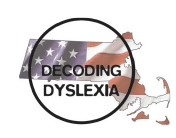Definition of Dyslexia
- Dyslexia is a specific disability that is neurological in origin. It is characterized by difficulties with accurate and/or fluent word recognition and by poor spelling and decoding abilities.
- These difficulties typically (but not solely) result from a deficit in the phonological component of language that is often unexpected in relation to other cognitive abilities and the provision of effective classroom instruction. The key indicators are poor rapid automatized naming speed and poor phonemic awareness.
- Secondary consequences may include problems in reading comprehension and reduced reading experience that can impede the growth of vocabulary and background knowledge.
- Although the disorder varies from person to person, common characteristics among people with dyslexia are difficulty with phonological processing (the manipulation of sounds), spelling, and/or rapid visual-verbal responding.
- http://nichd.nih.gov/health/topics/reading/conditioninfo/pages/disorders.aspx
- International Dyslexia Association (2002) http://eida.org/definition-of-dyslexia/
Learn About Dyslexia
- Read literature about dyslexia. Books, such as Overcoming Dyslexia by Dr. Sally Shaywitz, have been crucial
for many parents in understanding our children’s needs. - Check out IDA and MA IDA websites and literature.
- Take a parent training course in reading intervention so that you can help your
child at home. - Learn more about about state and federal special education laws by becoming a parent consultant through the
Federation for Children with Special Needs. - Take a parent advocacy course through a group such as SPAN to understand your child’s rights.
- Get second opinions through private testing by a university, learning center, educational consultant, speech pathologist, developmental pediatrician, occupational therapist, physical therapist and/or other specialists.
- Speak to advocates, educators in public schools and private practice, and special education attorneys.
- Attend seminars, get on mailing lists, and network with others from support groups and LD organizations in your area.
